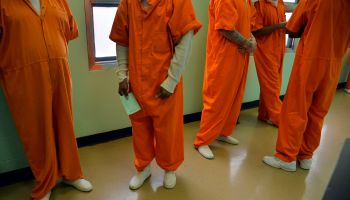
The electric chair at Holman Prison in Atmore, Alabama. | Source: Bettmann / Getty
Most of us know of the myriad of studies that show racial disparities exist in virtually all aspects of America’s criminal justice system. From arrests to sentencing to racial profiling to over-policing, it has been shown over and over again that Black people routinely get the short end of the “justice” stick once their fates are in the hands of legal authorities.
Well, a recent study now indicates that Black death row inmates are even disproportionately vulnerable to being victimized by botched executions.
MORE: Black People Experienced Botched Lethal Injections At Higher Rates, New Study Finds
Researchers for legal action nonprofit organization Reprieve recently released a study that analyzed conducted and attempted lethal injection procedures that had been recorded over the last 50 years.
From Mass Live:
They found that race significantly increases the odds of a botched execution, with Black people having 220 percent higher chances of experiencing one than white people.
“In their efforts to carry out executions at any cost, state officials have evaded oversight at every stage of the execution process and have engaged in illegal and underhanded practices which have contributed to botched executions,” researchers said.
The findings, which were published in a report released Thursday, focuses on 73 botched executions out of 1,407 total executions between 1977 and 2023 — what researchers called the modern era of capital punishment. About 8 percent of executions of Black people compared to 4 percent of white people were botched during that time frame.
Researchers found that Arkansas, Georgia and Oklahoma had the highest “observable” racial disparities when administering lethal injections. Ohio and the federal government had high rates of botched procedures and Alabama had the highest number of executions that were stopped midway. Arkansas and Oklahoma additionally had a higher rate of botched procedures of Black people, (75 percent and 83 percent, respectively) despite Black people comprising about a third of both prison populations.
So, what’s the reason for this disparity? After all, what the Reprieve researchers found wasn’t like the data that shows Black men are given 20% longer sentences than white men who commit the same crime and have the same criminal history, or that White Americans use and sell drugs more often than Black Americans, but Black people are arrested on drug charges at far higher rates. Those statistics indicate a simple explanation: cops and courts are racist against Black suspects and defendants, and that implicit (and often explicit) bias affects, either consciously or unconsciously, the way Black people are treated within the justice system.
But it’s a little harder to believe that executioners are out here looking at Black death row inmates and saying, “You know what? Let me intentionally mess this up!” Then again, perhaps I’m underestimating how thoroughly systemic racism is baked into the justice system, even to the point where it extends to the method in which inmates are executed.
“White supremacy runs through every stage of our criminal punishment system. It dictates the disproportionate removal of Black jurors from the honor and responsibility of jury service, more severe punishment for crimes with white victims, and, too frequently, race-predicted investigations and arrests from the outset,” Brian Stull, the deputy director of the ACLU’s capital punishment project, said in a statement. “Thanks to Reprieve’s new report, we now know that this pattern continues on through executions, where being Black more than doubles a condemned person’s risk of experiencing a botched or torturous execution.”
Still, the study doesn’t appear to explain explicitly how botched executions happen more often to Black inmates, especially if the malfunctions are happening randomly. What is clear, however, is that execution methods, particularly lethal injections, are probably not as safe and humane as advocates for capital punishment would have us believe.
More from Mass Live:
Most states use one drug or a cocktail of three to render prisoners unconscious, paralyze them to conceal evidence of pain and, finally, to stop their heart, researchers said. Proponents claimed it would be a quick and humane way to put people to death, but there is no evidence to support this.
According to the report, lethal injections, which prison officials usually administered without medical training, frequently result in botched executions that result in prolonged and painful deaths. Indicators of these botched executions included the person speaking and moving, visible reactions to pain, experiencing an allergic or violent reaction to the drugs or the executioner having difficulties locating veins or administering the drugs.
The new analysis refutes claims that lethal injections are quick and painless. Rather, botched procedures were found to be prolonged – some for several hours – and painful, with some people showing signs of choking, vomiting and bleeding in the execution chamber. Researchers said the painful deaths may be hidden by the process, including the use of a paralytic drug, tight straps to hold the person down, a white sheet to hide the body or the drawing of a curtain to block witnesses’ view.
It is for this reason, and many others, actually, that the controversy behind capital punishment isn’t as cut-and-dry as some make it out to be. And since studies also indicate that Black people are far more likely to be wrongly convicted of murder than white suspects, and that the vast majority of people exonerated from death row are Black or Latino, with more than half of death row exonerees being Black, it’s safe to say that Black people have cause to be wary of the justice system that is in charge of executions, whether we agree with capital punishment in general or not.
SEE ALSO:
GOP Lawmaker Who Suggested Death Row Inmates Die ‘Hanging By A Tree’ Says He’s Sorry



